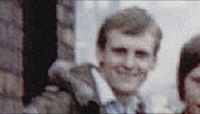
A former British soldier who said he had shot dead a young Catholic man in north Belfast could not have carried out the killing, according to the North’s Historical Enquiries Team (HET).
Michael McLarnon was murdered on October 28th, 1971, by a British soldier as he stood at his doorway at Etna Drive in Ardoyne in north Belfast. On the same night in the same area, John Copeland, father of well-known north Belfast republican Eddie Copeland, was also killed by the same patrol.
In January 1975 former British soldier Cliff Burrage wrote to Mr McLarnon’s parents claiming he had shot their son and asking for forgiveness. Mr Burrage, who had been awarded the Military Cross, said he had decided to ask Mr McLarnon’s parents for for giveness after becoming a born-again Christian.
The soldier said he had been hiding in a house on Etna Drive with other soldiers on the night of the shooting but had been seeking revenge after having been hit on the head with a bottle some nights earlier.
He claimed he had shot the 22-year-old after seeing him carrying a rifle. The dead man’s family rejected this.
Mr Burrage said he believed he had killed three other people in Ardoyne during various tours of duty.
In 2006 he took part in a BBC documentary along with Mr McLarnon’s sister Mary Kelly and Archbishop Desmond Tutu. He later took part in a documentary with veteran republican Martin Meehan in which he again claimed to have killed Mr McLarnon and other unnamed people. He continued to insist that Mr McLarnon had been carrying a rifle when he killed him.
However, a report by the Historical Enquiries Team discounted Mr Burrage’s claims and concluded he could not have fired the fatal shots. The report said a forensic examination of the killing shows that his position at the time meant it would have been physically impossible for him to have killed Mr McLarnon.
The report also said it could find no evidence to support Mr Burrage’s belief that he had killed three other people in Ardoyne.
It said that it is more likely that Mr McLarnon was killed by another group of soldiers who had been in Etna Drive some time later.
It concluded that there were “major failings” in the murder investigation, which “rendered it ineffective” as the shooting had been investigated by military police and not the civilianised RUC.
The investigation also concluded that the soldier who killed Mr McLarnon had also killed John Copeland.
Recalling her brother’s shooting, Ms Kelly said: “Michael stumbled into the house telling my mother he’d been shot. He died five hours later inhospital.”
Recalling how the British army immediately claimed her brother had been a gunman, Ms Kelly said: “The heart wasn’t torn out of my family once that night. It was torn out twice.
“No one wanted to listen to us.
“There was no [police] investigation. His character was destroyed. We were like lambs to the slaughter.”
She was “delighted” her brother’s name was cleared.
Ms Kelly said from her experience of the Tutu-mediated interview, she found Mr Burrage to be something of a “Walter Mitty-type character”.
“The guy thought he was some kind of James Bond and was trying to clear his conscience here for some reason or other but basically what he was saying to me didn’t ring true.
“I only took part in that programme to clear Michael’s name.
“Before my father died he said to me: ‘Mary, there may be a day of reckoning and if there is, then try and get Michael’s name cleared’.
“Today we have Michael’s name cleared.
“The world now knows Michael McLarnon wasn’t a gunman. He was just an ordinary fella that lost his life and that’s all we wanted to say.”
Speaking yesterday, John Copeland’s son Eddie, said: “We want to study this document and have sought legal advice about the way forward.
“My family wants to know who murdered my father and why this soldier was never brought to justice for murdering two unarmed men.”
![[Irish Republican News]](https://republican-news.org/graphics/title_gifs/rn.gif)
![[Irish Republican News]](https://republican-news.org/graphics/title_gifs/harp.gif)

